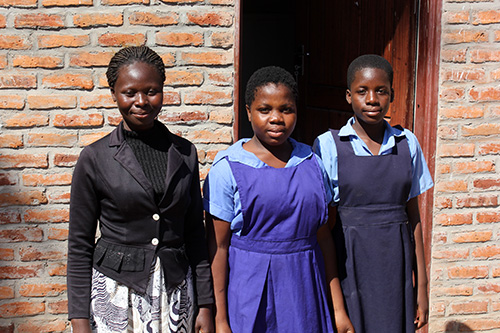News
Periods not a problem thanks to pad-making club in Malawi
- 12 August 2016
News
SENGA BAY, Malawi – After finishing class for the day, Fatima Muhammed and Deborah Chavula head to their school’s sewing room to make sanitary napkins. It is an unusual after-school activity, but a vital one: They distribute the pads to their fellow female students, helping to keep girls from missing class or dropping out because of their periods.
Fatima and Deborah, both 13, began leading this activity at their school, All Angels Primary in Senga Bay, Salima District, after attending a week-long training session on reproductive health and hygiene. The session included lessons on how to make the pads using sewing machines.
Girls in Malawi have high levels of enrolment in primary schools – 97 per cent, according to the most recent State of World Population report – but by secondary school, this number drops to 30 per cent. Among the many reasons for girls’ low retention rate is lack of affordable hygiene products that would enable them to attend class during their periods.

This is where Fatima and Deborah’s club is making a real difference.
“There is great change in attendance in class among our fellow girls,” said Fatima. “Most girls come to school even during menstruation period, and never miss lessons.”
The pads they make are reusable, and the materials are locally sourced and cheaper than disposable sanitary napkins.
The Salima District Council provides the materials, with funding from UNFPA through the Joint UN Programme on Girls Education. The joint programme also runs the training sessions where girls learn how to make the pads.
Nine girls at All Angels Primary have attended these trainings, and five others are currently being trained.
Patricia Chabuka, a teacher, estimates that about 290 female students at the school need sanitary napkins. She has seen the programme’s positive effects first-hand. “We used to have more girls absenting themselves from school for the main reason of menstruation, and since this skill was provided to these girls, things have changed,” Ms. Chabuka said.
Similar trainings are being conducted in other districts where the Joint Programme on Girls Education is being implemented. The success of the initiative has led to recommendations that mothers’ groups and vulnerable young women, such as teenage mothers, receive training in pad-making as way to earn or supplement their incomes.
Girls in Malawi face enormous challenges to staying in school. In addition to lacking essential hygiene supplies, they often lack age-appropriate reproductive health information and care, putting them at risk of early pregnancy. Malawi has one of the highest adolescent pregnancy rates in the Eastern and Southern Africa region, and girls who become pregnant typically drop out of school.
The Joint Programme on Girls Education was launched to address these challenges. A collaboration of UNFPA, UNICEF and the World Food Programme, with funding from the Norwegian Government, the programme aims to improve girls’ access to school and to increase re-enrolment of girls who have dropped out.
It is also strengthening education quality by incorporating messages about human rights, sexual and reproductive health, HIV prevention and other lessons into the curriculum and school activities. The programme is targeting 81 schools in the districts of Salima, Mangochi and Dedza for a duration of three years.
One sign that the programme is working is that girls are beginning to demand more from their schools and from themselves.
"As far as we know," Fatima said with a smile, "our fellow girls have no excuse to miss lessons due to menstruation."
– Henry Chimbali